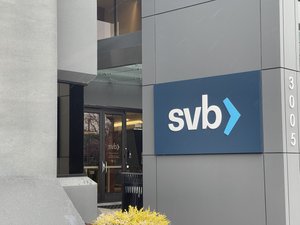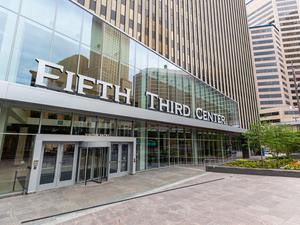
The failure of Silicon Valley Bank appears to have had a minimal impact on startups and venture capital firms in Cincinnati and Ohio, although one of the region’s largest law firms said additional financial institutions are likely to fail and has assembled a “Failed Bank Response Team” to help its clients weather the storm.
Silicon Valley Bank failed on Friday in a stunningly swift collapse and was closed by regulators. SVB is considered the leading bank catering to the nation’s startups.
The federal government on Sunday said it would protect depositors at SVB. Customers at Silicon Valley Bank will be able to access their entire deposits on Monday morning, per officials in Washington, though the government is still seeking a buyer for the bank's assets.
Locally, only three of Refinery Venture’s 15 portfolio companies had ties to SVB, Tim Schigel, the firm’s managing partner, told me. Mike Venerable, CEO at CincyTech, said the Avondale-based seed stage investor also had limited exposure.
CincyTech does not bank with SVB. Rather, it partners with a local bank, as do many of the companies it’s invested in.
Venerable spent the bulk of the weekend following along with Twitter Spaces discussions on the SVB collapse. It offered a good source of live expert analysis.
Over the last several days, he also said venture leaders across the state have been in constant conversation – collaborating on the impact the fallout could have on Ohio and how to best navigate the situation, along with partners on the state and federal level. Sen. Sherrod Brown, who serves as chairman of the Senate banking committee, had been in contact, he said.
While it had “some risk” across its portfolio with respect to SVB’s failure, Venerable said there “short-term, 0 to 30 days” contingency plans were quickly put in place. Schigel additionally said many VCs he talked with were prepared to backstop portfolio companies to buy them more time.
With the fed’s response Sunday evening, many contingencies discussed are no longer pending issues.
Longer term is unclear. Future due diligence and treasury management will be key.
“This is just the first five minutes of the first inning,” Schigel said. “There are rumblings there will be ripples from this that will set the industry back for decades. I don’t think it’s that extreme. It’s going to cause people to understand the risk side of the equation, which happens in recessions and down times anyway. And it increases diligence across the board, which I don’t think is a bad thing.”
Venerable added decentralization – the potential consequences that come from having venture capital proceeds in a single institution – should be viewed as a national imperative.
Ohio, beyond Northern California, has an important role to play in the innovation economy.
Venture capital remains a lifeblood.
“(SVB’s) customers have been portrayed as billionaire VCs in the media, but the majority of customers are not that,” he said. “They’re small startup companies and failing to find a resolution had the potential for significant damage.”
There will be ripple effects. Every publicly traded bank lost value last week – shares at SVB-competitors First Republic Bank and PacWest Bancorp are down 60% and 25% respectively.
Nathan Berger, an attorney at Frost Brown Todd, said both First Republic and PacWest sit in risky, “precarious positions,” although the Federal Reserve System also is providing funding to prevent any future failures.
The firm this weekend assembled a five-member “Failed Bank Response Team” – working around the clock to support area businesses and clients who had investments at SVB and New York-based Signature Bank, which the FDIC closed Sunday.
He said that team will be active until buyers for SVB and Signature are found. If the FDIC does not find respective buyers, portions of the team will remain active through a related FDIC auction of assets.
Whether the “contagion effect” will extend to more traditional regional banks, he doesn’t expect that – even though some may be losing customers to larger financial institutions.
"This is unprecedented,” Berger said. "In 2008, banks that (failed) were plagued by bad assets that deteriorated over time. We saw it coming. SVB … it failed in 48 hours, and in the age of social media, it was an old-fashioned run on the bank. The issue now is how do we help our impacted clients: do they want to sit and wait or how do we help them move their relationship to another financial institution?”
More on Sunday's news: U.S. regulators invoked a provision of banking law that allows the government to insure all deposits – not just the initial $250,000 typically insured by the Federal Deposit Insurance Crop. – citing a systemic risk to the banking system if they do not. The Washington Post reported earlier Sunday the plan was under consideration.
“Today we are taking decisive actions to protect the U.S. economy by strengthening public confidence in our banking system,” said a joint statement from Fed Chairman Jerome Powell, Treasury Secretary Janet Yellen and FDIC Chairman Martin Gruenberg. “This step will ensure that the U.S. banking system continues to perform its vital roles.”
The statement came just hours before trading was to begin in Asia, an effort by the administration to signal the continued strength of the U.S. banking system.
The officials said they will take a similar approach to the deposits of Signature Bank. In both cases, shareholders and some unsecured debtholders of the bank will not be protected.
Signature Bank represents the third-largest failure in U.S. banking history, behind SVB.
Bridge banks are formed through the FDIC to bridge the gap between a bank failure and the point where the FDIC can stabilize the bank and reach what it calls an orderly resolution, which typically results in the bank’s assets being sold to another bank.
The officials stressed no taxpayer money will be used; the deposits will be covered by a special $100 billion fund set up after the financial crisis that banks pay into.
Yellen pledged earlier Sunday on television talk shows there would be no taxpayer bailout for Silicon Valley, though Republicans who warned against a bailout are likely the secretary's statement.
In most bank failures, the government finds a buyer to take over the failed bank's operations, often within days of a collapse.
Federal officials opened an auction for the Silicon Valley Bank's assets Saturday and accepted bids until 11 a.m. Pacific time. But the government's announcement, released at about 4 p.m. Pacific time, made no mention about those discussions or any potential deal with another financial institution to take over SVB.
CNBC reported that a senior Treasury official said a sale is still possible but at this late point in the weekend they determined to go ahead and introduce the systematic risk to instill confidence in the market.
Senior management at SVB has been removed. The bank, led by CEO Greg Becker since 2011, had $209 billion in total assets and about $175 billion in total deposits at the end of the year.
It had 8,555 full-time employees.
Douglas Fruehling, editor-in-Chief at the San Francisco Business Times, contributed to this report.







